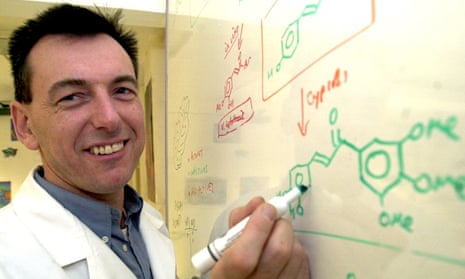My father, Gerry Potter, who has died aged 63, was a medicinal chemist who dedicated his career to designing lifesaving cancer drugs. In the early 1990s, he and his colleagues at the Institute of Cancer Research in London designed the hormone therapy drug abiraterone acetate. It was patented in 1993, eventually approved in 2011 and is now one of the leading treatments of advanced prostate cancer, branded as Zytiga.
Gerry was born in Rugby, the third of six children of Joyce (nee Wilson), a housewife, and Anthony Potter, who worked in Norfolk county council’s highways department. Moving to Norwich aged six, Gerry went to St Augustine’s primary school in Costessey, and then to Wymondham college.
Leaving at 16 after his O-levels, Gerry went to work as a “lab lad” for a pharmaceutical company located nearby. One summer, feeling the itch for change, he took a job at Butlin’s in Bognor Regis, where he met Cath Kay, a student at Hull University. He moved to Hull and they married the following year, in 1980, and had two sets of twins: Justina and me, and then Danielle and Robert, born four years later.
Gerry worked in the lab of an edible oil refinery and took A-levels part-time at night school, studying chemistry and maths. He then went to Manchester University to study inorganic chemistry, and our family moved to join him in the city in 1986. My father then embarked on his dream PhD (awarded in 1990), in medicinal chemistry, at the Institute of Cancer Research at the Royal Marsden hospital in London.
After the successful research developing abiraterone acetate, Gerry went on to work at the universities of Exeter and Lyon, in France, and at a biotech company in Cambridge.
In 1997, he joined De Montfort University, Leicester (DMU), as lecturer in medicinal chemistry – quickly becoming senior lecturer. He took to teaching straight away, surprising himself at how much he enjoyed it. Leicester and the surrounding areas became his home, where he enjoyed his chalet in the woods and, later, camping with his grandchildren.
Gerry continued to excel at teaching chemistry, and in 1999 was made professor of medicinal chemistry; he later also became the director of the Cancer Drug Discovery Group at the university. One of his biggest achievements while at DMU was the discovery of a class of phytonutrients he coined Salvestrols, compounds found in plants which are believed to have anti-cancer properties.
He won several prizes for his work, including the Royal Society of Chemistry innovation award three times (1990, 1996 and 2011).
In 2006 Gerry suffered from mental health problems and was diagnosed with bipolar disorder. This took some adjusting to; however, in recent years, he began to enjoy spending more time with his family, especially his eight grandchildren, Aneurin, Olivia, Ronnie, Rowan, Inigo, Catalina, Lexi and Beau.
Gerry and Cath divorced in 1996. His father died a week after him. He is survived by his children and grandchildren, his mother, and his five siblings, Christopher, Anne, Teresa, Dominic and Adele.
